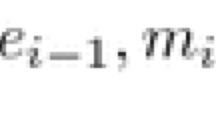Abstract
This paper aims to reconcile (i) the intuitively plausible view that a higher degree of coherence among independent pieces of evidence makes the hypothesis they support more probable, and (ii) the negative results in Bayesian epistemology to the effect that there is no probabilistic measure of coherence such that a higher degree of coherence among independent pieces of evidence makes the hypothesis they support more probable. I consider a simple model in which the negative result appears in a stark form: the prior probability of the hypothesis and the individual vertical relations between each piece of evidence and the hypothesis completely determine the conditional probability of the hypothesis given the total evidence, leaving no room for the lateral relation (such as coherence) among the pieces of evidence to play any role. Despite this negative result, the model also reveals that a higher degree of coherence is indirectly associated with a higher conditional probability of the hypothesis because a higher degree of coherence indicates stronger individual supports. This analysis explains why coherence appears truth-conducive but in such a way that it defeats the idea of coherentism since the lateral relation (such as coherence) plays no independent role in the confirmation of the hypothesis.
Similar content being viewed by others
References
Bovens L., Hartmann S. (2003). Bayesian epistemology. Oxford University Press, Oxford
Olsson E.J. (2005). Against coherence: Truth, probability, and justification. Oxford University Press, Oxford
Shogenji T. (1999). Is coherence truth-conducive?. Analysis 59:338–345
Shogenji T. (2003). A condition for transitivity in probabilistic support. British Journal for the Philosophy of Science 54:613–616
Author information
Authors and Affiliations
Corresponding author
Rights and permissions
About this article
Cite this article
Shogenji, T. Why does coherence appear truth-conducive?. Synthese 157, 361–372 (2007). https://doi.org/10.1007/s11229-006-9062-8
Published:
Issue Date:
DOI: https://doi.org/10.1007/s11229-006-9062-8




